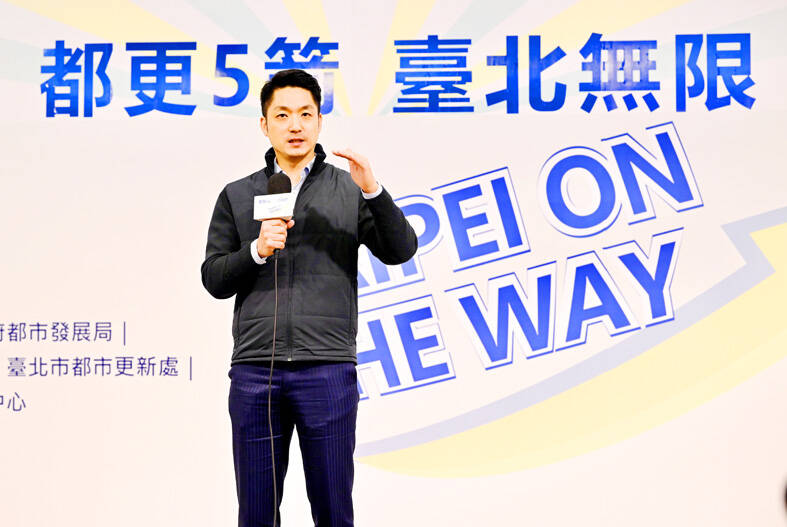The Taipei City Government is to launch five initiatives to encourage urban renewal, as about 72 percent of buildings in the capital are at least 30 years old, Taipei Mayor Chiang Wan-an (蔣萬安) said yesterday.
“Buildings constructed at least 30 years ago account for about 72 percent of all buildings in the city, so urban renewal is an urgent issue,” Chiang said, adding that the initiatives “are not only about creating a comfortable living environment, but also about safety.”
“Many people are concerned about the potentially devastating impact of a major earthquake,” he said.

Photo: Lo Pei-de, Taipei Times
The city government would encourage urban renewal by lowering the application threshold, easing regulations, speeding up reviews, removing obstacles and increasing incentives, he said, outlining the five-part plan.
Lowering the application threshold for government-led urban renewal cases from 90 percent to 75 percent and offering government-assisted assessments, price calculations and housing selection — the two phases of the first part — were announced on Friday last week, he said.
The Taipei Housing and Urban Regeneration Center received dozens of telephone calls inquiring about the initiatives, showing how much demand there is for urban renewal, he added.
“Easing regulations” would include exempting four review criteria for the reconstruction of unsafe and old buildings, easing the application threshold for projects involving buildings on slopes deemed to be at risk and allowing submissions of multiple applications at once, he said.
There are many elderly people living in old buildings near slopes, but the rules demand that every resident agrees to a reconstruction project, he said, adding that with the eased regulations, sites deemed to be dangerous can be designated as urban renewal areas by the city government.
“Accelerating reviews” is required because it takes 28 months on average to review an urban renewal proposal, Chiang said.
The city has several ideas to simplify administrative procedures, such as reducing the business plan review process from six months to five, and a “130 urban renewal project” that would reduce the review phases from two to one and complete them within 30 days, he said.
“Removing obstacles” aims to deal with cases in which there are a few households that are unwilling to allow an urban renewal plan, allowing the city government to proceed with reviews and demolitions if two or more coordination meetings have been held by the urban renewal executor and the city government, he said.
“Increasing incentives” is for old buildings that cannot undergo renewal, but have many elderly residents with disabilities, Chiang said.
Subsidies to build elevators would be increased to NT$3 million (US$98,058) from NT$2.5 million, or about 60 percent of the construction budget, he said, adding that this is expected to increase the number of applications to 30 from 15 per year.

An undersea cable to Penghu County has been severed, the Ministry of Digital Affairs said today, with a Chinese-funded ship suspected of being responsible. It comes just a month after a Chinese ship was suspected of severing an undersea cable north of Keelung Harbor. The National Communications and Cyber Security Center received a report at 3:03am today from Chunghwa Telecom that the No. 3 cable from Taiwan to Penghu was severed 14.7km off the coast of Tainan, the Ministry of Digital Affairs said. The Coast Guard Administration (CGA) upon receiving a report from Chunghwa Telecom began to monitor the Togolese-flagged Hong Tai (宏泰)

Actor Lee Wei (李威) was released on bail on Monday after being named as a suspect in the death of a woman whose body was found in the meeting place of a Buddhist group in Taipei’s Daan District (大安) last year, prosecutors said. Lee, 44, was released on NT$300,000 (US$9,148) bail, while his wife, surnamed Chien (簡), was released on NT$150,000 bail after both were summoned to give statements regarding the woman’s death. The home of Lee, who has retreated from the entertainment business in the past few years, was also searched by prosecutors and police earlier on Monday. Lee was questioned three

RISING TOURISM: A survey showed that tourist visits increased by 35 percent last year, while newly created attractions contributed almost half of the growth Changhua County’s Lukang Old Street (鹿港老街) and its surrounding historical area clinched first place among Taiwan’s most successful tourist attractions last year, while no location in eastern Taiwan achieved a spot in the top 20 list, the Tourism Administration said. The listing was created by the Tourism Administration’s Forward-looking Tourism Policy Research office. Last year, the Lukang Old Street and its surrounding area had 17.3 million visitors, more than the 16 million visitors for the Wenhua Road Night Market (文化路夜市) in Chiayi City and 14.5 million visitors at Tainan’s Anping (安平) historical area, it said. The Taipei 101 skyscraper and its environs —

Taiwan on Friday said a New Zealand hamburger restaurant has apologized for a racist remark to a Taiwanese customer after reports that it had first apologized to China sparked outrage in Taiwan. An image posted on Threads by a Taiwanese who ate at Fergburger in Queenstown showed that their receipt dated Sunday last week included the words “Ching Chang,” a racial slur. The Chinese Consulate-General in Christchurch in a statement on Thursday said it had received and accepted an apology from the restaurant over the incident. The comment triggered an online furor among Taiwanese who saw it as an insult to the